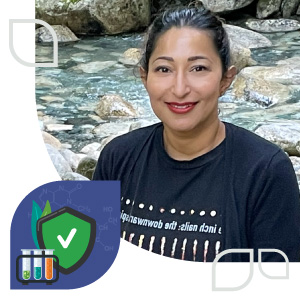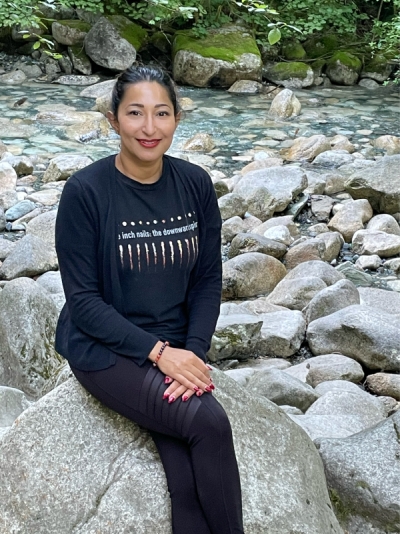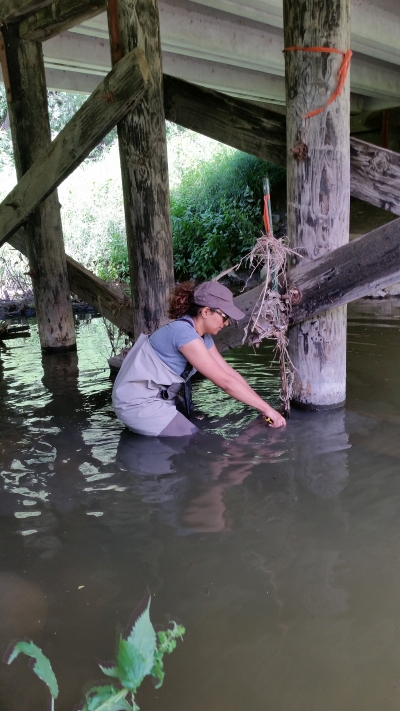Spotlight on science: Federal Open Science Repository of Canada
Profile of Kim Rattan
Federal Open Science Repository of Canada

Kim Rattan loved her hip-waders. She was out in the field, schlepping equipment around, gathering data. That was some years ago, the Algae Years.
Kim is now an ECCC Science Program Coordinator, and if she wears hip-waders to work that’s on her, because she mainly sits at a desk.
From her vantage point as a Science Program Coordinator, she’s pleased that some of her hard-won data – now part of publications permanently kept in the FOSRC – is permanent, safe, and open to all.
The Federal Open Science Repository of Canada is a new web-based portal making Government of Canada research widely available. It was developed by the Federal Science Library Network (FSLN) in response to Canada’s Chief Science Advisor’s Roadmap for Open Science. The new repository supports the goal of greater openness in federal science and research activities. It’s an online resource, allowing researchers at Environment and Climate Change Canada to freely share their scientific publications with other researchers around the world.

Kim sitting near a stream in Squamish B.C.
Scientists at ECCC are working closely with Library Services to upload their publications to the Federal Open Science Repository, with hundreds of publications available online. The portal was launched and running on January 15, 2024.
Whether you’re a biologist, a data specialist or a climate researcher with Environment and Climate Change Canada, your ECCC colleague Kim Rattan has a few thoughts as to why uploading your publications is a good idea – good for the world, and good for your career.
First – the FOSRC is an example of the principles that ECCC scientists live by: relevance, transparency, responsiveness, excellence and collaboration.
“It’s such a great idea because other scientists, working in academia, or with NGOs or conservation authorities… can use the data; they can use this with the premise of ‘well I’m going to study this body of water, because there’s ample research being done. What can I do to make it more accessible or affordable for my group?’” Kim says.
It’s this idea of “what can I contribute?” that drives many scientists’ sense of purpose – a commitment to knowledge, and how that knowledge can solve problems locally, nationally, and internationally.

Kim checking water levels in Winnipeg, Manitoba.
Kim has uploaded two publications to the Federal Open Science Repository. One is titled, “Evaluating Diffuse and Point Source Phosphorus Inputs to Streams in a Cold Climate Region Using A Load Apportionment Model”. She says that sharing scientific work, even from years ago, supports the mandate of Environment and Climate Change Canada, encouraging scientists and non-scientists to look at biodiversity, to look at species at risk, and to encounter new knowledge about the planet.
“Right now, it’s such a mystery, what we do,” Kim says, and adds that open access will allow every Canadian, every global citizen, to know what scientific inquiry is being done, and why. “It’s one of the pillars of the mission of a scientist, public service: we’re doing this for you, for our country,” Kim states. “It gives people a starting point. They say, ‘Let me look at this federal department, and let’s see what research has already been done.’ And then people might say well what can I do?”
It’s a two-way street, says Kim, so by opening up a free digital resource online, Canadians may be more inclined to report what they see around them – observations of water quality, contaminants, or biodiversity. The FOSRC will also serve to make new knowledge freely accessible.
“While we, as individuals and a department, work at Indigenous reconciliation, [we can consider], ‘Okay Western science, this is what we’ve done.’ So, now let’s try to see how Indigenous knowledge can influence this,” Kim says.
For a scientist, an online open science repository means that more people can find you in a moment when they need expertise. It may also lead to them wanting to know why you’re doing this: What drives someone to wade into swamps every summer, up to their armpits in algae, or to face stinging icy winds while taking ice core samples? The great thing about open science is that curiosity often leads to... more curiosity. Encouraging an appetite for scientific knowledge is one of many public benefits of the Federal Open Science Repository portal.
Kim Rattan is happy that her work now has a permanent, freely accessible home online. “For all of us, it makes you part of something larger than yourself. You’re sharing your knowledge. You published this in a closed system, and now, why not make it open for all?”
This great made-in-Canada digital initiative is open to the public to view, and open for ECCC scientists and researchers to post their work, now. Depositing your Environment and Climate Change Canada research publication is as simple as contacting ECCC Library Services. To read more about the FOSRC, visit Federal Open Science Repository of Canada.